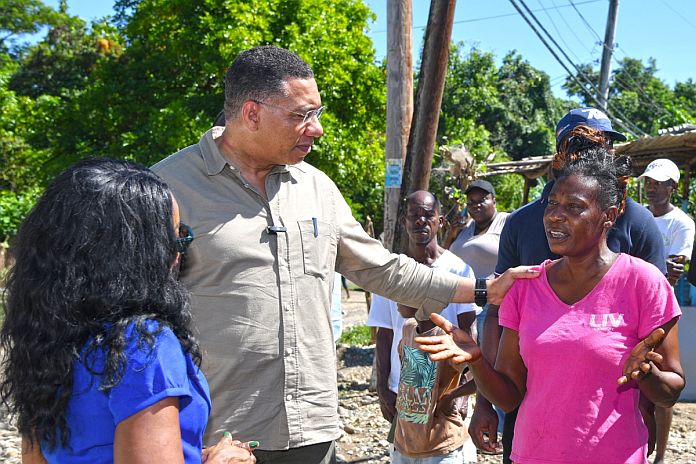By Mickella Anderson-Gordon
KINGSTON, Jamaica – Jamaicans are being implored to consider environmental and climate change issues when deciding where to build a house.
Speaking during a tour of flood-affected sections of St. Andrew and St Thomas November 19, 2023, prime minister, Andrew Holness, said that some persons are living in “dangerous areas,” which heighten their safety risks during natural disasters.
“Coming from the tour, by air especially, it is clear that some Jamaicans have chosen to live in areas that are dangerous because those areas are susceptible to weather events. People have chosen to live on hillsides that are precarious, people have chosen to live very close to riverbanks and some even build in river courses. We have quite a number of communities that are perched precariously on gully banks,” he said.
He noted that while the nation is thankful that there was no loss of life from the recent heavy rains, this may not always be the case, as these natural events are becoming more frequent and of higher intensity, pointing out that a 50-year weather event is now occurring once every two years.
As a result, he said, with every severe weather event, the probability that a house built in a danger zone gets damaged, increases.
“So, maybe 30 or 50 years ago you could say ‘I would build here and I don’t have anything to worry about’; that’s not the case now,” the prime minister reasoned. “I will use this opportunity to urge Jamaicans…in seeking to settle and seeking to find a place to live, take into consideration the environmental issues and the climate change issues, particularly…having to do with your access to water (and) with the stability of the slope.
“If you have to clear the land, how would that affect the stability of the slope? And then, pay attention to the climate change issues, if you are going to have frequent weather events,” the prime minister implored.
Holness highlighted areas in St Andrew where he said the government will have to “put down its foot” to prevent persons from building in dangerous zones, for their own safety.
“We will have that conversation with the people and enforce the legislation that are in place, and maybe, we will have to put in new legislation,” he said.





